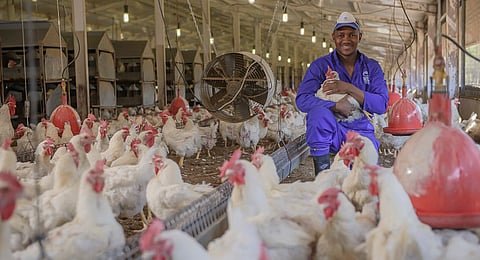RCL’s Master Plans for sugar and chicken
*This content is brought to you by RCL Foods
Industry frameworks are being developed to address challenges local poultry and sugar groups continue to face due to cheap imports and supply-demand imbalances.
RCL Foods says master plans for the chicken and sugar industries aimed at addressing structural challenges and supply-demand imbalances will hopefully return them to sustainable profitability. The plans, which are being driven by industry and the government, are aimed at containing imports in the case of chicken and protecting local producers from unfair trade. Although the sugar industry is also in severe distress, an improvement in RCL's business helped support first-half earnings.
The branded food producer owns the Selati sugar and Rainbow and Farmer Brown's chicken brands. It also has extensive groceries and baking operations, that make everything from mayonnaise and peanut butter to pies, buns and rolls.
Over the six month to end-December, it restructured its operations, combing its Consumer and Sugar & Milling units into a single Food division. In all, it has amalgamated its eight former business units into four new operations that it says are closely aligned.
After a tough comparative period, RCL said an improvement in its sugar business helped drive a rise in underlying profit in the first half of its financial year, helped by higher market pricing and bigger sales volumes. Despite the recovery, it said lower local demand on the back of the Health Promotion Levy (sugar tax) continued to drive a shift towards lower margin raw exports. Fierce competition prevailed across all markets, with margins coming under pressure in order to protect volumes. It said its chicken operations continued to face tough conditions as cheap imports continued to keep the local market oversupplied.
Revenue rose 7.1% to R14.2bn in the six months to end-December and earnings before interest, tax, depreciation and amortisation (EBITDA) increased by 7.7% to R1.17bn. Underlying EBITDA grew by 11% to R1.03bn. EBITDA is a measure of a company's operating performance. Headline earnings per share (HEPS) fell 2.7% to 53.3c due to a negative accounting adjustment of R84.4m on commodity procurement positions and a negative R23.4m impact from the new IFRS 16 accounting treatment of leases. Underlying HEPS, which exclude material once-off costs and accounting adjustments, grew 23.8% to 63c. It has maintained its interim dividend at 15c per share.
Among the measures take to position itself for future growth, RCL said it acquired Imperial Logistics's cold chain business, ICL, in December, entering new agreements with its customers. It was also spending R80m to expand its pie manufacturing facilities and was leveraging its Rainbow brand to start manufacturing species.
"In response to the challenging market conditions, RCL Foods have focused on the business drivers within our control – building an integrated business with a high-performance culture, applying continued discipline in operational leverage, investing in our brands and launching innovative products and extensions," the company said.

